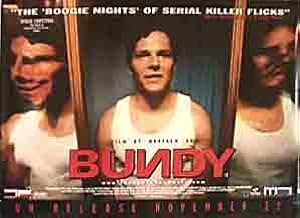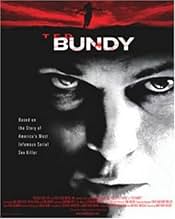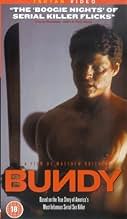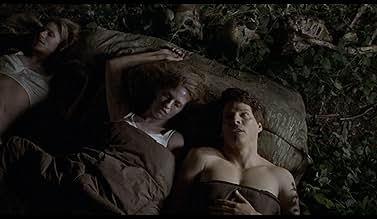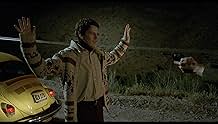Ted Bundy
- 2002
- Public Averti
- 1h 39min
NOTE IMDb
5,8/10
8,5 k
MA NOTE
Ajouter une intrigue dans votre langueThe story of serial killer Ted Bundy.The story of serial killer Ted Bundy.The story of serial killer Ted Bundy.
- Réalisation
- Scénario
- Casting principal
- Récompenses
- 3 nominations au total
Boti Bliss
- Lee
- (as Boti Ann Bliss)
Annalee Autumn
- Girl Attacked on Street
- (as Anna Lee Wooster)
Samantha Tabak
- Vincennes
- (as Tricia Dickson)
Eric DaRe
- Male Partygoer
- (as Eric Dare)
Renee Intlekofer
- Cutler
- (as Renee Madison Cole)
Avis à la une
I rented this because I expected it to be intense, having seen Matthew Bright's work in "Freeway". It's definitely that. It's hard not to compare it to "The Deliberate Stranger": each focuses on a different aspect of Bundy's story. "Stranger" focused more on the investigation and the actual facts, and Mark Harmon's performance captured the smoothness and charm which enabled Bundy to gain his victims' trust. This movie is all about the animal beneath. In reality, Bundy's ability to keep that beast hidden was part of what enabled him to carry on as long as he did. This film lays bare that monster, and shows it in all its ugliness. I'm seeing a lot of criticism of this movie for being good at what it set out to do: to make you share in the revulsion of what Ted Bundy was. Complaining that it's in bad taste? What does 'taste' have to do with a sadistic animal who snuffed out dozens of young womens' lives, just to fulfill his need to feel powerful? In this respect, this movie is superior to "Stranger": that one is much too tame and sanitized. What kind of hypocrite watches a movie about a serial killer, and complains that it's too lurid? While "Stranger" is more successful as a factual and interesting telling of Bundy's story, this is a much more impactful movie that makes you feel as though you're actually in the room with that demon. Only 15 minutes into the movie, I felt filthy just from watching his odious behavior. Bright's purpose here was not so much to make a biography as it was to use Bundy's story to point out something fundamental about human nature: the desire for control, and how it drives us to harm each other. While not as good as Bright's earlier "Freeway", it's still a good, disturbing movie, much in the brutal vein of "Henry, Portrait of a Serial Killer". It's actually much more violent - especially sexually - than the latter, though not as gruesome.
This movie is not for the faint-of-heart; it's a story about a vicious serial killer, and does not pretty up the subject matter. Thus there are numerous scenes of bloody and perverse sex, dead bodies galore, lots of profanity, and an overall atmosphere of sickness. None of this is pleasant to watch, but is entirely appropriate for the subject matter.
The script stays close to fact, although it leaves out some important information; neglecting, for example, to mention that one woman Bundy approached at Lake Sammamish refused to follow him into the parking lot. Her evidence provided a description and a name to a previously faceless monster, the first real lead the police had in the case. The movie also fails to give any real sense of the era in which Bundy flourished. In the swinging seventies, it was not so uncommon for women to get into cars or otherwise accept approaches from total strangers -- one reason for Bundy's success.
This film suffers from a lack of focus and purpose. It does give a good sense of the progression of Bundy's hideous career: the burglarizing, purse-snatching, shoplifting peeping tom gradually deteriorates into the brutal, raping, murdering serial killer. We see his alcoholism, his ability to be totally charming when necessary, and his knack for attracting "enabling" girlfriends into his life. What we don't see is anything of the inner Bundy. Granted, any depiction of the "inner Bundy" would be pure speculation, but a good movie would at least make an attempt to give some motive for Bundy's violent compulsions. All this movie does is make some vague references to his illegitimacy.
I need to also mention the incredibly poor taste in background music. In some sequences, light-hearted music is playing while Bundy is committing heinous acts of violence. (Christmas music in one case!) Perhaps the director meant to indicate that all this horror was just plain fun to Bundy; but the effect is to cheapen the scenes and even make them comic.
The verdict: Iffy. Lacks depth, and occasionly shows poor taste. Leaves out important information. On the plus side, it is well-acted, and does not attempt to sugar coat the ugly facts of violence. If you want a thoughtful examination of Bundy's character and the era in which he lived, this is not the right movie.
The script stays close to fact, although it leaves out some important information; neglecting, for example, to mention that one woman Bundy approached at Lake Sammamish refused to follow him into the parking lot. Her evidence provided a description and a name to a previously faceless monster, the first real lead the police had in the case. The movie also fails to give any real sense of the era in which Bundy flourished. In the swinging seventies, it was not so uncommon for women to get into cars or otherwise accept approaches from total strangers -- one reason for Bundy's success.
This film suffers from a lack of focus and purpose. It does give a good sense of the progression of Bundy's hideous career: the burglarizing, purse-snatching, shoplifting peeping tom gradually deteriorates into the brutal, raping, murdering serial killer. We see his alcoholism, his ability to be totally charming when necessary, and his knack for attracting "enabling" girlfriends into his life. What we don't see is anything of the inner Bundy. Granted, any depiction of the "inner Bundy" would be pure speculation, but a good movie would at least make an attempt to give some motive for Bundy's violent compulsions. All this movie does is make some vague references to his illegitimacy.
I need to also mention the incredibly poor taste in background music. In some sequences, light-hearted music is playing while Bundy is committing heinous acts of violence. (Christmas music in one case!) Perhaps the director meant to indicate that all this horror was just plain fun to Bundy; but the effect is to cheapen the scenes and even make them comic.
The verdict: Iffy. Lacks depth, and occasionly shows poor taste. Leaves out important information. On the plus side, it is well-acted, and does not attempt to sugar coat the ugly facts of violence. If you want a thoughtful examination of Bundy's character and the era in which he lived, this is not the right movie.
"Ted Bundy" is definitely one of the most unpleasant viewing experiences I struggled myself through this year, but - then again - that is only logical since the actual Ted Bundy also was one of the most unpleasant persons to ever walk the planet's surface. And then still, I certainly don't have to complain about feeling unpleasant, because the (too) many people that crossed paths with Bundy, notably the victims and their families, truly must have gone through hell.
Between 2000 and 2009, there was a gigantic wave of true crime movies about US serial killers. Since horror cinema was going through a long non-fertile and uninspired period, this was a God's gift for many directors (*) because portraits of real serial killers don't much of a plot. All the notorious figures received one or even several biopics: Ed Gein, Aileen Wuornos, Zodiac Killer, John Wayne Gacy, BTK-killer, Jeffrey Dahmer, Richard Ramirez, the Lonely Heart Killers. Ted Bundy could not be left out of this list, of course, but just as Bundy himself was an unusual killer who could not be classified within the known profiles, his biopic also can't be compared to all the routine and inferior films about other serial killers.
Why is "Ted Bundy" worth your time if you have the stomach for it? For starters because there was a multi-talented and promising (at the time, at least) director involved. Matthew Bright demonstrated, with the excellent "Freeway" and "Confessions of a Trick Baby", that he doesn't avoid sensitive taboo subjects like teen prostitution, drug addiction and child abuse. He was the ideal man to narrate the shocking but story of Bundy as raw, nihilistic, and disturbing as it really was.
Secondly, Matthew Bright was enormously "helped" by how absurd and unfathomable the facts in the case of Ted Bundy were. His story is one of those that simply must be factual because, if it had been written as fiction, people would claim it's totally implausible and unrealistic. How is it possible that Bundy made so many victims and remained under the radar for so long, even though his modus operandi and means of transportation were so conspicuous? How can a woman remain so loyal to a man who abuses and humiliates her, like Bundy did to Lee? How can it be that someone like Bundy escapes from jail twice or receives declarations of love from hundreds of women after his conviction? The explicit violence and cruelty in this film is often hard to look at, notably the scene in the cabin and the "submission fantasy", especially when realizing this freak and monster could do whatever he pleased for several years.
Between 2000 and 2009, there was a gigantic wave of true crime movies about US serial killers. Since horror cinema was going through a long non-fertile and uninspired period, this was a God's gift for many directors (*) because portraits of real serial killers don't much of a plot. All the notorious figures received one or even several biopics: Ed Gein, Aileen Wuornos, Zodiac Killer, John Wayne Gacy, BTK-killer, Jeffrey Dahmer, Richard Ramirez, the Lonely Heart Killers. Ted Bundy could not be left out of this list, of course, but just as Bundy himself was an unusual killer who could not be classified within the known profiles, his biopic also can't be compared to all the routine and inferior films about other serial killers.
Why is "Ted Bundy" worth your time if you have the stomach for it? For starters because there was a multi-talented and promising (at the time, at least) director involved. Matthew Bright demonstrated, with the excellent "Freeway" and "Confessions of a Trick Baby", that he doesn't avoid sensitive taboo subjects like teen prostitution, drug addiction and child abuse. He was the ideal man to narrate the shocking but story of Bundy as raw, nihilistic, and disturbing as it really was.
Secondly, Matthew Bright was enormously "helped" by how absurd and unfathomable the facts in the case of Ted Bundy were. His story is one of those that simply must be factual because, if it had been written as fiction, people would claim it's totally implausible and unrealistic. How is it possible that Bundy made so many victims and remained under the radar for so long, even though his modus operandi and means of transportation were so conspicuous? How can a woman remain so loyal to a man who abuses and humiliates her, like Bundy did to Lee? How can it be that someone like Bundy escapes from jail twice or receives declarations of love from hundreds of women after his conviction? The explicit violence and cruelty in this film is often hard to look at, notably the scene in the cabin and the "submission fantasy", especially when realizing this freak and monster could do whatever he pleased for several years.
The story of Ted Bundy is a truly fascinating one. The movie "Ted Bundy" however, failed to portray many of the most interesting periods in his life. That, along with one glaring bit of unrealism and a complete lack of tastefulness kept me from enjoying this movie. Some fine acting performances make the film watchable, but only barely.
Ted Bundy had a troubling childhood where he discovered in his early teens that he was illegitimate and that the man who had acted his father was in fact not. This was a terrible shock to young Ted and he retreated into pulp fiction detective stories that were actually soft-core pornography. Between feeling he had been betrayed by his mother and the sexual arousal he got from these stories, his pathos began to form.
All the while, Ted Bundy got good grades and kept up appearances at school. He graduated high school and college without real difficulty. He became very politically active for the Republican party here in Seattle, and made some contacts that would later be horrified to learn to whom they had given allegiance, most notably a man named Ralph Munro who would become the Attorney General of the state of Washington.
It is at this point where the movie starts, and not with his political prowess, but rather with a relationship he had with a local woman. The film depicts him trying to have genuine human contact and showing real concern to this woman, two things of which this monster was completely incapable. It only briefly shows him in a social situation where he proves highly charismatic, and can get almost anyone to like him within a few moments, a trait necessary to his future endeavors.
These scenes in Seattle offer a technical quibble as they seem to have been shot in Pasadena or some other southern CA location. There are shots with the San Gabriel Mountains in the background and some dreadful scenes at a park where the background is very sparse. Here in Seattle, one would have to drive 100 miles or more to find a park with a hillside barren of trees in the background, but this does not discourage our film makers. The most aggravating part of this is the fact that there are many places in northern CA that could have been used for Seattle without running the cost up too much, but the producers of the film were evidently not concerned.
Most of the rest of the film is devoted to his killings, and even shows a couple with seemingly perverse pleasure. While they do show him as a monster, there is almost a sick humor to them that I found somewhat inappropriate. The film does well to show that one of his jail breaks was facilitated by his befriending a guard.
The film completely disregards one of the most fascinating periods of his life however; his trial. Ted Bundy proved to be a fairly adept attorney and was able to mount a creative defense and the judge even complimented him on his litigation skills when pronouncing the verdict. While in prison awaiting trial, Ted Bundy developed a romance and went so far as to call the woman as a witness in his trial, and make his wedding vows part of his murder trial. This is totally overlooked by the movie.
All in all, this movie seems to be an excuse to show a couple of rape-murders rather than a serious attempt to understand the mental mis-wiring of one of the sickest persons ever to walk the face of the earth.
Ted Bundy had a troubling childhood where he discovered in his early teens that he was illegitimate and that the man who had acted his father was in fact not. This was a terrible shock to young Ted and he retreated into pulp fiction detective stories that were actually soft-core pornography. Between feeling he had been betrayed by his mother and the sexual arousal he got from these stories, his pathos began to form.
All the while, Ted Bundy got good grades and kept up appearances at school. He graduated high school and college without real difficulty. He became very politically active for the Republican party here in Seattle, and made some contacts that would later be horrified to learn to whom they had given allegiance, most notably a man named Ralph Munro who would become the Attorney General of the state of Washington.
It is at this point where the movie starts, and not with his political prowess, but rather with a relationship he had with a local woman. The film depicts him trying to have genuine human contact and showing real concern to this woman, two things of which this monster was completely incapable. It only briefly shows him in a social situation where he proves highly charismatic, and can get almost anyone to like him within a few moments, a trait necessary to his future endeavors.
These scenes in Seattle offer a technical quibble as they seem to have been shot in Pasadena or some other southern CA location. There are shots with the San Gabriel Mountains in the background and some dreadful scenes at a park where the background is very sparse. Here in Seattle, one would have to drive 100 miles or more to find a park with a hillside barren of trees in the background, but this does not discourage our film makers. The most aggravating part of this is the fact that there are many places in northern CA that could have been used for Seattle without running the cost up too much, but the producers of the film were evidently not concerned.
Most of the rest of the film is devoted to his killings, and even shows a couple with seemingly perverse pleasure. While they do show him as a monster, there is almost a sick humor to them that I found somewhat inappropriate. The film does well to show that one of his jail breaks was facilitated by his befriending a guard.
The film completely disregards one of the most fascinating periods of his life however; his trial. Ted Bundy proved to be a fairly adept attorney and was able to mount a creative defense and the judge even complimented him on his litigation skills when pronouncing the verdict. While in prison awaiting trial, Ted Bundy developed a romance and went so far as to call the woman as a witness in his trial, and make his wedding vows part of his murder trial. This is totally overlooked by the movie.
All in all, this movie seems to be an excuse to show a couple of rape-murders rather than a serious attempt to understand the mental mis-wiring of one of the sickest persons ever to walk the face of the earth.
I have seen almost every serial killer movie ever made. I, also work in the mental health field. Combining this information, I still cannot completely believe what I just watched. Someone in the production was privied to actual mental health knowledge, because this presentation was very realistic. The TV movie dealt with the obsession, but not with the actual disease. This version dealt with the progression of violence and the increasing brazeness of the psychotic mind. Sometimes, it is hard to watch realistic violence, and separate it from every day violence. The director nailed the unstable personality traits to a tee. Ted Bundy was an animal and a human being, waiting for his true love. There never was one and he paid the ultimate price. If, only Clozaril had been available then.
Alan Sheldon
Alan Sheldon
Le saviez-vous
- AnecdotesIn the scene when Ted and his girlfriend Lee are celebrating with friends at a party, a woman walks up to Lee introducing herself as "Beverly" and talks to her about working with Ted at a crisis center. Her character is clearly a reference to Ann Rule, a true-crime author who met and worked with the real Ted Bundy at a crisis center in Seattle, Washington during the early 1970s. Furthermore, Rule did, in fact, meet and talk with the real Ted Bundy's girlfriend at a Christmas party one year. Rule would later write a book about Bundy and his murders.
- GaffesEarly on in the movie Ted attacks a woman with a hammer handle. As he grabs her, the handle - which is supposed to be hard wood - bends at the base to reveal that it is rubber.
- ConnexionsReferenced in Vintage Video: Forbidden Zone (2020)
- Bandes originalesMartha's Street
by Dominic Glynn (uncredited) and Martin Smith (uncredited)
Published by Chappell Recorded Music Library
Meilleurs choix
Connectez-vous pour évaluer et suivre la liste de favoris afin de recevoir des recommandations personnalisées
- How long is Ted Bundy?Alimenté par Alexa
Détails
Box-office
- Budget
- 1 200 000 $US (estimé)
- Montant brut aux États-Unis et au Canada
- 6 073 $US
- Week-end de sortie aux États-Unis et au Canada
- 1 710 $US
- 15 sept. 2002
- Montant brut mondial
- 68 716 $US
- Durée1 heure 39 minutes
- Couleur
- Mixage
- Rapport de forme
- 1.85 : 1
Contribuer à cette page
Suggérer une modification ou ajouter du contenu manquant



